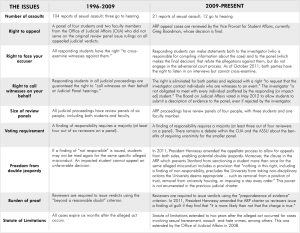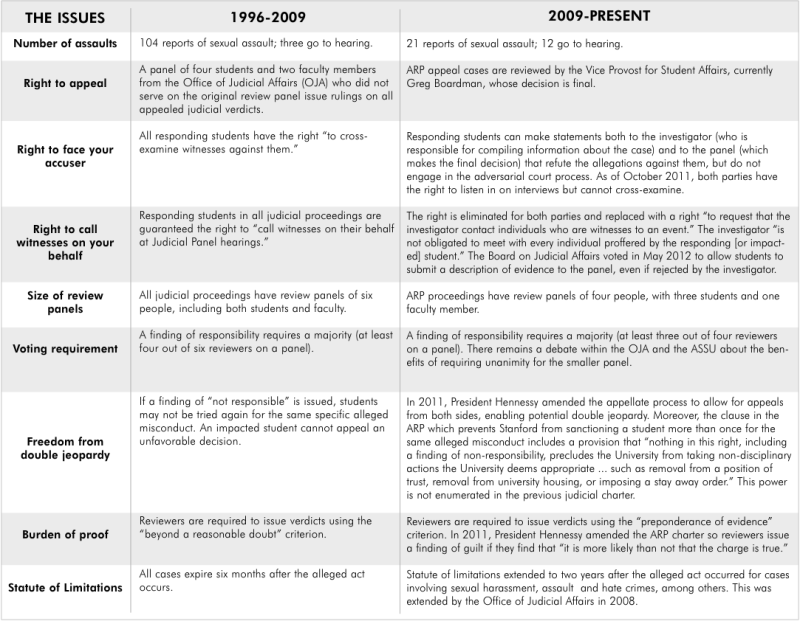
The ASSU and the Office of Community Standards (OCS) will host two public town hall meetings on Oct. 23 and Oct. 24 to discuss the Alternative Review Process (ARP), the judicial procedure for cases involving sexual assault, stalking and relationship violence. The OCS and the ASSU legislative bodies plan to use feedback from the town halls to guide further discussion and reform efforts for the ARP.
The ARP was developed in April 2010 in response to data showing that only three out of 104 cases of sexual assault went to hearing between 1996 and 2009. In the two years since the ARP’s inception, 13 of 21 reported cases went to trial. Since its implementation, the ARP has been unilaterally revised by the Office of the President and extended through a clause in the University’s judicial charter granting the president the right to enforce regulations governing student conduct in “extraordinary circumstances.”
In April 2011, President Hennessey changed the standard of proof to “preponderance of evidence” from “beyond a reasonable doubt” after the Office of Civil Rights published the Dear Colleague Letter, an interpretation of federal anti-discrimination law Title IX. His executive action also gave both the responding and impacted student equal power of appeal.
Like all judicial proceedings on campus, the ARP is under the authority of the ASSU, of which all graduate and undergraduate students are members. The ASSU bylaws delegate management of judicial hearings to the OCS, although the Undergraduate Senate, the Graduate Student Council and the President of the University have maintained the power to overrule any suggested policy of the OCS.
Office of the President
Because the ASSU Constitution contains a clause on the rights of the accused, namely the right “to be considered innocent until proven guilty beyond a reasonable doubt,” President Hennessey’s order would normally violate students’ rights as ensured by the ASSU Constitution, a legally binding contract between the University and the student body.
At ASSU Senate meetings last year, former President Michael Cruz ’12 expressed concern that responding students who are found responsible under a standard of preponderance of evidence may be able to sue the University for breach of contract because of this apparent contradiction.
According to Cruz, the ARP is only legally legitimate by Hennessey’s authority to override his contractual obligations to the ASSU. This primary power comes from a clause in the Judicial Charter of 1997, granting the President the right to enforce regulations governing student conduct in “extraordinary circumstances.”
The ASSU
When it approved the ARP charter in 2010, the Board of Judicial Affairs emphasized “that [the ARP] is a pilot program…” and wrote that it “intends that the program will conclude at the end of June 2012.” Yet, despite contentious debate from all sides, the ARP continues today without any approval from the student body.
In recent interviews, ASSU President Robbie Zimbroff ’12 indicated that he expects the ARP to remain in force until some replacement procedure is approved.
Although both the 13th and 14th Graduate Student Councils and Undergraduate Senates have engaged in debate about the ARP, Zimbroff reported in September that there has been very little work toward a resolution.
At their second-to-last meeting of the 2011-12 academic year, the OCS decided to organize a working group over the summer under the direction of Dean of Student Life Chris Griffith. Zimbroff said that the group, consisting of several ASSU representatives and members of the OCS, met once this summer to discuss mostly logistical issues concerning how to engage students.
“There wasn’t a whole lot of coordinated effort,” he said.
At their Oct. 16 meeting, the Undergraduate Senate decided to delay ARP discussion until after this week’s town halls.
“I still think a lot of people including myself still don’t feel 100 percent comfortable making a decision as big as ARP knowing that it will affect many people,” Senator Shahab Fadavi ’15 said, “[But] it would be nice to come to a conclusion and finally have some sort of an endorsement from the Senate for a particular way of handling the ARP.”
